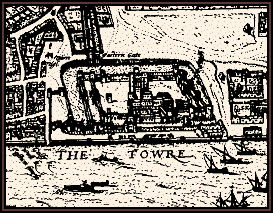He confesseth that before Christmas last the Earl of Essex entered into consideration how he might secure himself to have access to the Queen’s presence without resistance, and that the resolution was agreeable to certain articles written by the Earl of Essex his own hand, (and sent to the Earl of Southampton to surprise the Court), and that there were diverse consultations about it, and the points were these:
First, to take the Tower, for it would command London; then to surprise the Court. And after the Court being taken and possessed, to have assembled the rest of their friends, and to have presented themselves to the Queen. And that being done and the Guard secured, Sir Christopher Blount should keep the outward gates of the Court; Sir John Davies, the Hall and Watergate; Sir Charles Danvers (this Deponent) should keep the Presence and Guard Chamber, and seize upon the Halberds’ and [Gentlemen] Pensioners’ battle-axes.

The intent was to surprise the Captain of the Guard [Raleigh] at the Court or at his own house, and some others, and then to surprise the City of London. And that the Earl of Essex resolved (these things being accomplished) immediately to have called a Parliament to reform disorders and private grievances.
That this Deponent utterly disliked of these courses and after the alarm was given at Court, he persuaded the Earl rather to flee into Wales, or other parts beyond the seas for his security, and avoiding the imminent danger he was fallen into, than to trust to the City. And lastly, he protested for his own part, what he had done in the business was merely for the love he bore to the Earl of Southampton and not for any malice or private discontent otherwise.